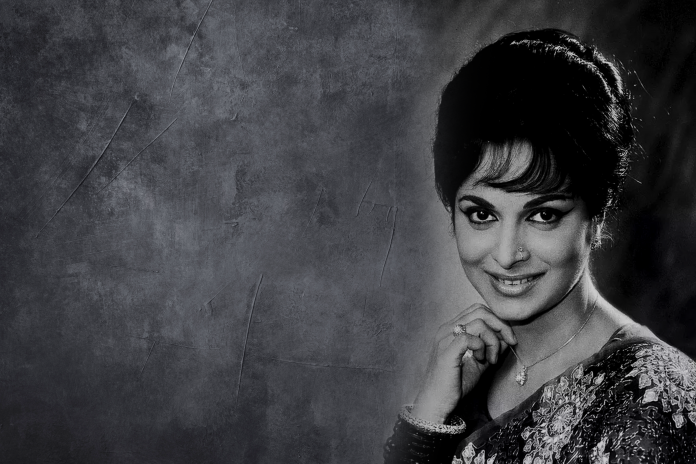Reading Time: 8 minutes
There is an unforgettable scene in the film Guide. Rosie, played by Waheeda Rehman is the daughter of a devdasi is in a loveless marriage to an older archeologist (Kishore Sahu). He treats her like a dumb trophy and forbids her from dancing, which is her passion. Marco pays more attention to sculptures of women in caves that he studies for his work. Finally, Rosie confronts him in one of those ancient caves and screams “Marco main jeena chahti hoon.”
She leaves him for Raju (Dev Anand), who loves her and encourages her career ambitions. They openly live together, and as she gets famous, she finds Raju’s neediness annoying, and when Marco causes a misunderstanding, Rosie does not prevent Raj from going to jail for embezzlement.

In 1965, when Hindi cinema leading ladies had to be virtuous, they were either suffering tragedy queens or chirpy heiresses (stunt star Fearless Nadia was an exception), Rosie was a one-woman revolution. The director, Vijay Anand, working with an RK Nayaran novel, was told audiences would never accept Rosie, and it would end Waheeda Rehman’s career. The film was a success, however, and did not even cause a tiny dent in Waheeda’s career.
Other actresses had done films in which they had careers, Nutan, Nargis, Sharmila Tagore had worn swimsuits on screen to indicate their modernity, but Rosie was one of the earliest feminists in Hindi cinema, before the word was even in common usage. And Waheeda Rehman personified, with tremendous power, a woman who values her career and her dignity and does not let a man dictate terms to her. The story was about Raju’s spiritual redemption, but Rosie discovers herself too, even if it is to end up on the side of Raju, who is now a changed man.
Winner of this year’s Dadasaheb Phalke Award for lifetime achievement, and deservedly so, Waheeda Rehman’s name is included in the short list of women who have been selected for the honour for their “outstanding contribution to the growth and development of Indian cinema.” The first award that was instituted in 1969 to honour the father of Indian cinema, went to Devika Rani. Since then, only six other women have been conferred with this award, Ruby Myers (Sulochana), Kanan Devi, Durga Khote, Lata Mangeshkar, Asha Bhosle, Asha Parekh and now Waheeda Rehman.
When she was introduced to the Hindi film industry, with a small ‘vampy’ role in Guru Dutt’s CID (1956), the role of the heroine in Hindi cinemas had not yet been devalued, as it was later in the Seventies, when leading ladies were given merely decorative roles, because the hero had to have a romantic interest with whom to sing songs. In Waheeda Rehman’s time, Nargis, Meena Kumari, Madhubala, Vyjayanthimala, Nutan were at their peak, and doing significant roles in their films. They also had their own strengths and fan following.

Rehman’s professional (and personal) relationship with Guru Dutt meant that she got to play roles that were very different from the usual romantic leading lady. Actresses of the time would have balked at playing a streetwalker, which she did in Pyaasa (1957), or the actress who leaves her mentor behind in Kaagaz Ke Phool (1959), Guru Dutt’s most personal film set in the Bombay film industry.
It is not as if she did not do popular love stories like Solva Saal, Ek Phool Char Kaante, Chaudhvin Ka Chand, but directors obviously did not select her to sing a few songs and prop up the hero. In 12 o’ Clock (1958) she played a murder accused, in Neel Kamal (1968) for which she won her second Filmfare Award (after Guide) she played a woman haunted by a past life.
She played a courtesan, Chameli Bai, who marries a dacoit (Sunil Dutt) in the masterpiece Mujhe Jeene Do (1962), and follows him into a rough life in the ravines of the Chambal; she played a very different kind of nautch girl in Basu Bhattachary’s Teesri Kasam (1965) opposite Raj Kapoor, a more sprightly and playful woman.
The other film, which remains a jewel in her career is that of a nurse in a mental asylum in Khamoshi (1968), who takes her job of curing two mentally disturbed men (Dharmendra, Rajesh Khanna) so seriously, that she loses her own mind.
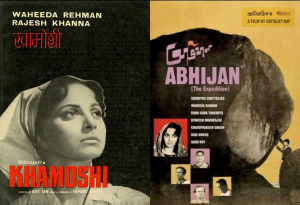
She won a National Award for Reshma Aur Shera (1971), a story of star-crossed lovers from warring clans in Rajasthan (opposite Sunil Dutt), not her best, but it was just one more in her list of great films; her filmography is also studded with offbeat films, like Satyajit Ray’s Abhijan (1962) in which she played a complex part of a village widow; as the wife who inadvertently breaks her marriage in Phagun (1973); the small role in Yash Chopra’s Trishul (1978), that of an unwed mother, who tells her son to avenge her suffering, Gulzar’s underrated gem Namkeen (1982), in which she plays the harried mother who worries about her three unmarried daughters.
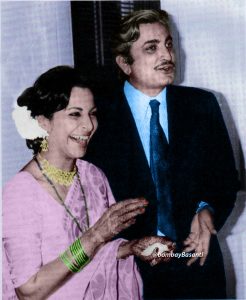
In 1964, she did a film called Shagoon, with an actor called Kamaljeet whom she married a decade later, moved to Bangalore, and raised two children, Sohail and Kashvi. By the late 1970s, the leading lady roles thinned out, the mother roles were offered; did not officially retire, but the films were few and far between. After the death of her husband in 2000, she returned to Mumbai. She just does a select number of films and always leaves a mark, again not playing the stereotypical granny. In her public appearances, she always came across as elegant and graceful, and as every new generation interested in cinema, discovers her films, her legend grows and glows

Waheeda Top 10
In a career studded with memorable films, a pick of just 10 that show Waheeda Rehman at her best:
Pyaasa (1957):
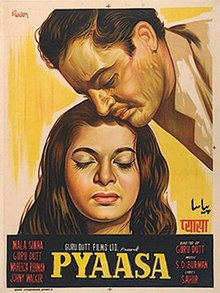
Early in her career, in the film directed by her mentor, Guru Dutt, she played a prostitute, Gulabo, who comes across the work of an unknown poet, Vijay (Guru Dutt), and later falls in love with him. When he is feared dead, a grieving Gulabo takes his poems to be published, but the unscrupulous publisher puts his own name on the book. Having seen the greed and betrayal of people, Vijay chooses to turn his back on fame and leaves to build a new life with Gulabo. It was an unusual and somewhat risky role, but the young actress she pulled it off, showing all traces of the talent that would grow with time.
Solva Saal (1958):
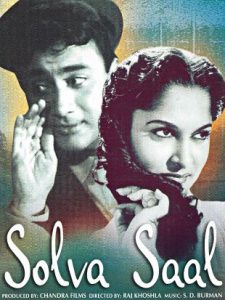
After doing the intense Pyaasa, Waheeda Rehman did a light romcom opposite Dev Anand with whom she made a successful and popular pair. She plays rich girl Laaj, who does not want to marry the man chosen by her father, and elopes with her secret boyfriend, who steals her heirloom pearl necklace and abandons her. A charming fellow traveller on the train (Anand) offers to help and they have a frenzied adventure over one night, before the necklace is recovered and she is safely dropped home. The film had some great SD Burman music too.
.Kaagaz Ke Phool (1959):
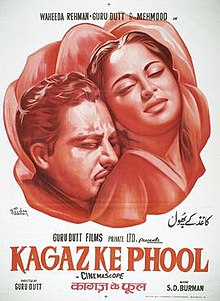 In Guru Dutt’s partly autobiograhical film, Waheeda Rehman plays Shanti, an ordinary woman who is propelled to movie stardom by director Suresh Sinha (Dutt). His marriage is acrimonious and there is a custody battle going on between him and his wife (Veena) for their daughter. Suresh is drawn to a sympathetic Shanti, but they cannot be together. Shanti rises in her career, while Suresh goes downhill. A very young Waheeda, also Guru Dutt’s discovery and protege, mirroring the film, played the complex role with confidence.
In Guru Dutt’s partly autobiograhical film, Waheeda Rehman plays Shanti, an ordinary woman who is propelled to movie stardom by director Suresh Sinha (Dutt). His marriage is acrimonious and there is a custody battle going on between him and his wife (Veena) for their daughter. Suresh is drawn to a sympathetic Shanti, but they cannot be together. Shanti rises in her career, while Suresh goes downhill. A very young Waheeda, also Guru Dutt’s discovery and protege, mirroring the film, played the complex role with confidence.
Mujhe Jeene Do (1963):
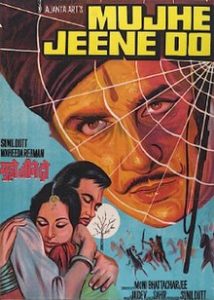
In Moni Bhattacharjee’s Mujhe Jeene Do, Waheeda Rehman played a Chamelijaan, a courtesan who gives up a life of comfort to live in the ravines with a Daku Jarnail Singh (Sunil Dutt), who loves and marries her. When they have a child, and the cops are out to destroy the bandit gangs, Jarnail sends her to live incognito in a village, but his violent past follows her. She brought out the many shades of a woman who personifies the travails of the innocent victims of circumstances not in their control.
Guide (1965):
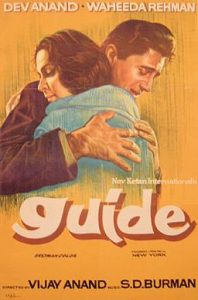
A role and a performance any actress could be proud of. In Vijay Anand’s masterpiece, she plays a dancer, Rosie, who leaves her nasty husband to be with Raju Guide (Dev Anand) who encourages her dreams and her career. Their relationship ends due his alcoholism and neediness, and a misunderstanding over money. At a time when women on screen were supposed to be chaste and submissive, Rosie was a firebrand.
Teesri Kasam (1966):
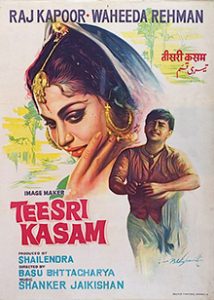
In Basu Bhattacharya’s debut as director, Waheeda Rehman played a nautanki perfomer, Hirabai, who is touched by the innocence of Hiraman, the bullockcart driver (Raj Kapoor), who is taking her to the fair where she is to perform. When men she encounters treat her as a plaything, Hiraman, unaware of the ways of the world, offers her affection and respect. She basks in this, knowing that the relationship can go nowhere, and that she can never be accepted into normal society. The actress gave Hirabai an appealing mix of playfulness, strength and melancholy.
Khamoshi (1970):
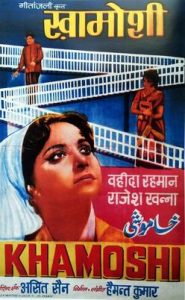
Waheeda Rehman played the difficult role of a nurse in a mental care facility. Directed by Asit Sen, the film starred Rajesh Khanna as the patient she falls in love with. After being left heartbroken by her love for a previous inmate of the asylum (Dhamendra in a guest appearance), the strain snaps her fragile mind. She played the role with sensitivity, bringing out the compassion and loneliness of the woman, whose sincerity to her duty is taken for granted by the doctors at the hospital.
Reshma Aur Shera (1971):
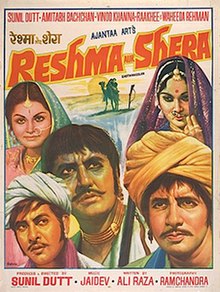
Directed by Sunil Dutt, who played Shera to Waheeda Rehman’s Reshma, in this doomed love story set in the desert. The two belong to rival Rajasthani clans, and their romance can only end in bloodshed. The stark locations, colourful costumes were stunning, and an air of foreboding suffused the film. Waheeda, playing a woman who tries to defy a traditional, deeply patriarchal society, won a National Award for her performace.
Namkeen (1982):
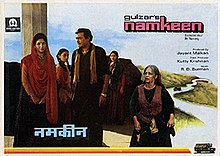
Gulzar made this film about a feisty old woman, Jugni, played by Waheeda Rehman, who used to be a folk dancer, now lives in poverty in a remote village, where she has raised three daughters (played by Sharmila Tagore, Shabana Azmi, Kiran Vairale). Jugni never depended on a man’s support but the constant fending off wolves has made her tetchy. She fiercely protects her daughters, but when a truck driver (Sanjeev Kumar) rents a room in her dilapidated house, she hopes at one least of the young women will marry him and escape her gloomy fate. A beautiful, underrated gem.
Swayam (1991):
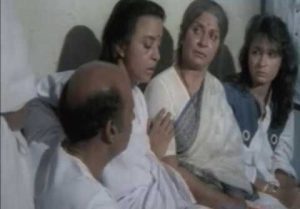
A little known film that was made for Doordarshan back in the day, directed by Mahesh Bhatt and in terms of its subject a bit ahead of its times. Waheeda played an elderly woman, Aparajita Chitre, who decides to stand on her own feet after the death of her husband. In spite of having lead a sheltered life, she does not want to depend on her two daughters, who are having marital problems of their own. She played the character with immense grace and dignity.



